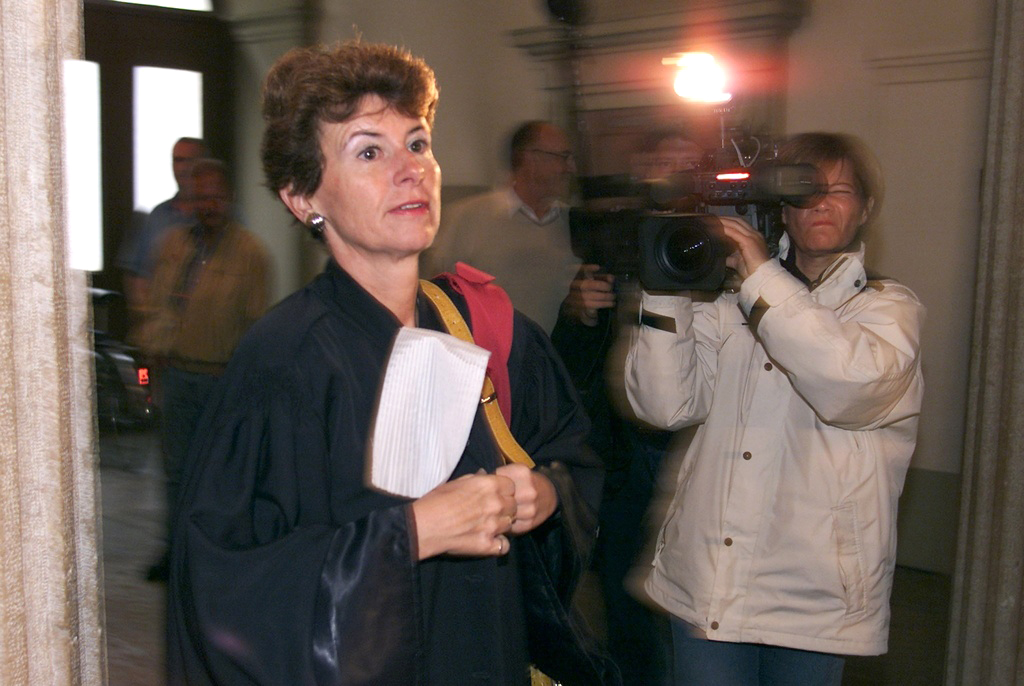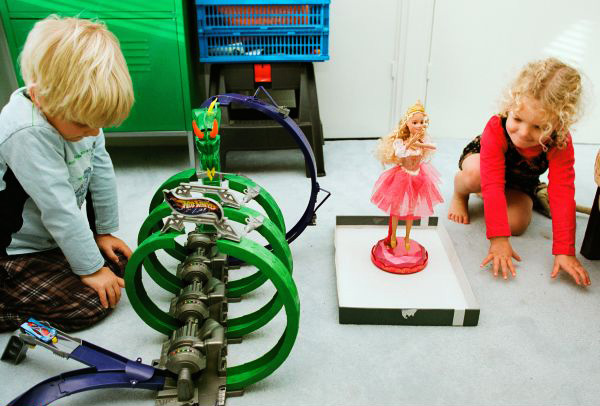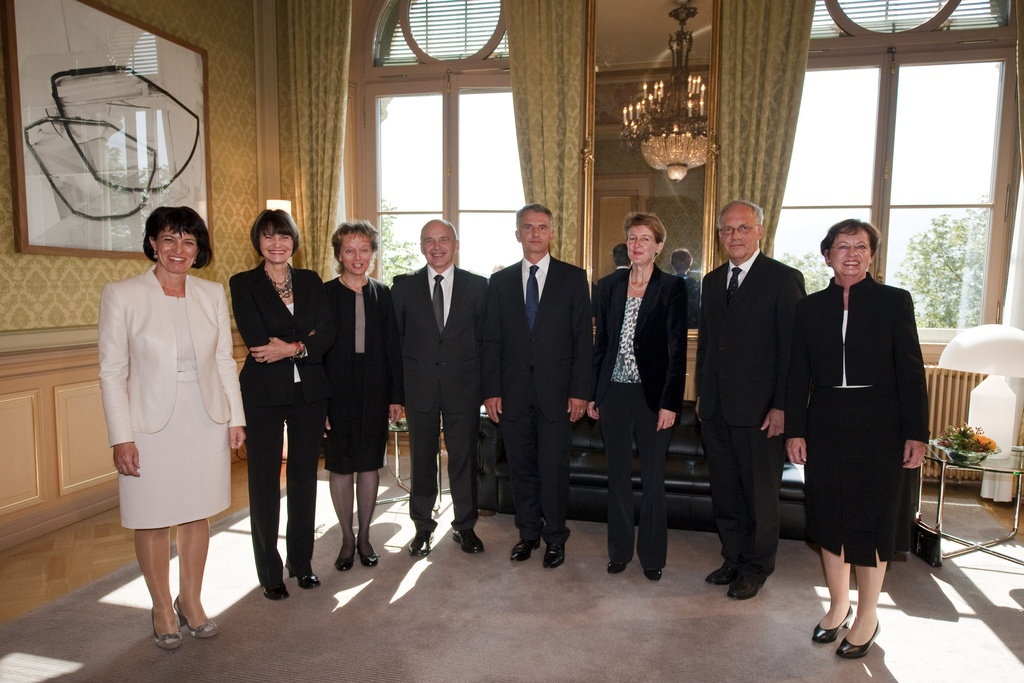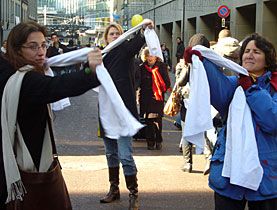Women find no justice in law profession

Although women in Switzerland are making progress as judges, there are still very few female court lawyers.
Long hours, the lack of part-time work and expectations that women will take up family rather than business law help explain the gap and why women in general don’t rise to the upper law echelons.
“When I was elected in 1990, I kept being asked: are you there because you had a career plan? My answer: not at all,” said Anne Colliard, the first female state prosecutor in Switzerland, who retired at the end of last year.
A man might not have been asked the same question. But what is clear is that Colliard’s election as state prosecutor in canton Fribourg came as a surprise.
Colliard had a brilliant career before being gaining the top prosecutor’s job. It wasn’t planned, but built up little by little, fruit of many hours of work and strict organisation.
“The job of a state prosecutor can’t be done part-time, basically because of all that it entails. It’s more of a 150 per cent job, with me working Saturdays, Sundays and late nights, so as to not lose time with my son [during the week],” explained Colliard.
“This needs great professional investment and a supportive family circle.”
The proof that it is not easy can be seen in the fact that only one woman currently holds a state prosecutor’s post, in canton Jura.
Work and family life
As women tend to be the ones juggling the office, children and housework, they often turn to part-time posts. But there are not many of these in the legal profession, either for state prosecutors or lawyers in general.
“Having part-time lawyers hasn’t yet become commonplace in the courts, it’s not well regarded,” said Anne-Louise Gillièron, a lawyer and president of the Alba Association for court lawyers.
Many women study law and gain admittance to the bar, but then they disappear. The Swiss Bar Association had only 23 per cent female lawyer members in 2010 – with the two Appenzell cantons boasting just one woman among their 32 members.
Part-time work has been a success among judges, with the number of women entering the profession rising since it was introduced. In canton Zurich they now make up 40% of judges; in the cantons of Vaud and Geneva, they even outnumber men at 54 per cent and 53 per cent respectively.
“In the mid-term, I have the impression that there will be as many women as men judges, or even a female majority. It’s already a reality in France at the French National School for the Judiciary,” said François Bohnet, head of the French-speaking section of the Swiss Judiciary Academy and vice-dean of the law faculty at Neuchâtel University.
Glass ceiling
However, part-time working does not address some of the fundamental inequalities that still dog the legal profession in Switzerland. As in many other professions, says Patricia Roux, head of the Gender Studies Centre at Lausanne University: “the higher you get in the hierarchy, the bigger the obstacles are for women and the more difficult it becomes to break through the glass ceiling”.
“It’s the same for salaries. There is less of a pay gap between a male and female worker than between a male and female lawyer,” she added.
There also seems to be a tendency to exclude women from certain areas of the law, like business law. “Boards are often male-dominated so they tend to give mandates to men. It won’t change until women are more present in the business world,” Alba’s Gillièron says.
Women are instead often involved in family law. “It’s a prestige issue, but also one of the division of tasks between men and women,” noted Roux.
“Women are socialised towards issues to do with family and caring. If the family wasn’t still the main responsibility of women, you wouldn’t see this situation on a professional level.”
This means that often, women’s choices are not really choices at all. “When you look over your clients over the past ten years and see that you have never been appointed by the court to represent the accused in a criminal case, you can’t believe that it’s true,” Gillièron said.
“Courts have excluded women from criminal law. Promises were made that things would change with the introduction of the new penal code from January 1 this year. We will see. “What’s needed is everyone getting their turn when being appointed by the court to represent the accused in criminal cases.”
The Vaud association Alba for female lawyers who are members of the bar was created on March 8, 2011. Founded by Vaud female lawyers, it is now chaired by lawyer Anne-Louise Gillièron, who has a practice in Yverdon.
It was set up to promote and help women to practise law. It campaigns against the fact that female lawyers are “almost exclusively” confined to family law and child protection.
The association also aims to encourage networking among women lawyers, especially with a view to doing part-time work. Networking can ensure there’s full-time and emergency cover. In order to encourage a better work-life balance, the association is also setting up a daycare centre that will open at times orientated toward a lawyer’s working hours.
The association also organises conferences and continuing education courses for lawyers. There’s no equivalent in German-speaking Switzerland, according to Gillièron
Twice the burden: According to the last Federal Statistics Office study on the subject in 2007, women spent almost twice as much time on domestic chores and the family as men. They spent an average of 30 hours compared with 18 hours for men.
54 hours: For women living in a couple with children under 15 years old, time spent on chores and the family rose to 54 hours and is thus higher than the normal working week. Men in the same category spent an average 28 hours a week on the same duties in addition to their working hours.
Source: Federal Statistics Office
(Translated from French by Isobel Leybold-Johnson)

In compliance with the JTI standards
More: SWI swissinfo.ch certified by the Journalism Trust Initiative




You can find an overview of ongoing debates with our journalists here . Please join us!
If you want to start a conversation about a topic raised in this article or want to report factual errors, email us at english@swissinfo.ch.